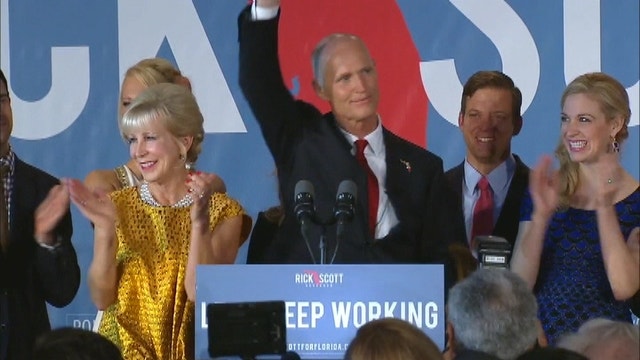Rick Scott gives a victory speech
Gov. Rick Scott became the second GOP governor ever in state history to win re-election. Scott beat former Florida Gov. Charlie Crist in the markedly nasty and most expensive political campaign in Florida history.
Florida Gov. Rick Scott became the second GOP governor ever in state history to win re-election.
Scott beat former Florida Gov. Charlie Crist in the markedly nasty and most expensive political campaign in Florida history.
Scott got 48.3 percent of the vote while Crist got 46.9 percent.
Indeed, it was a nail-biter race to the bitter end. Leading up to the election, various polls showed Crist ahead by a few points.
Crist had sought to take back his old job after switching parties, from Republican to Democrat. When he was governor, from 2007 to 2011, Crist was Republican.
Political experts had said a Scott victory would have been remarkable since his approval ratings have never been over 50 percent.
The race between Scott and Crist was heated and personal.
During the final night of campaigning Scott boldly predicted that "we are going to kick Charlie's rear."
Only two of Florida's 27 congressional districts were tight races.
In South Florida, Republican Miami-Dade County school board member Carlos Curbelo beat Democratic incumbent Rep. Joe Garcia, with 52 to 48 percent of the vote, with 94 percent of the precincts reporting results.
Garcia had been widely considered in danger of losing. Garcia rode into Washington two years ago on an anti-corruption platform, but then his camp faced its own corruption accusations.
In the Panhandle, Republican Congressman Steve Southerland was in a tough race with Democrat Gwen Graham, the daughter of Bob Graham, the popular former governor and U.S. senator. That race took a weird twist when Southerland defended an all-male fundraiser that encouraged donors to "tell the Misses (sic) not to wait up."
After Gwen Graham took issue, Southerland asked a reporter: "Has Gwen Graham ever been to a lingerie shower? Ask her. And how many men were there?"
For the governor’s race, Hispanic voters in Palm Beach, Broward and Miami-Dade counties, as well as the crucial I-4 corridor in central Florida, stood to play a key role in the election, given a strong turnout.
That’s why Scott and Crist picked Hispanic running mates for lieutenant governor, according to party leaders. Scott made Cuban-American Carlos Lopez-Cantera the first Hispanic lieutenant governor in state history. Countering Scott’s selection, Crist announced in July that Miami-Dade Democratic Party chief and state party vice-chairwoman, Annette Taddeo-Goldstein, whose mother is Colombian, would be his running mate.
The Florida Department of State Division of Elections counted 1,737,000 Latinos as registered to vote statewide as of general election book closing on October 6, 2014, according to the Pew Hispanic Center.
Latinos make up nearly 15 percent of the state’s roughly 12 million active registered voters.
Among Latino registered voters, 471,000 are registered as Republicans, making up 11.3% of all Republican registered voters, according to Pew. About 662,000 Latino registered voters are registered as Democrats, representing 14.3% of all Democratic registered voters.
That is a change from 2006, when slightly more Latinos in the Sunshine State were registered as Republicans than as Democrats.
In the final days of campaigning, Crist's supporters had portrayed Scott's agenda as anti-Hispanic.
Prominent lawmakers from Puerto Rico and California, among others, told Latinos voters that Scott had supported Arizona-style immigration crackdown laws and other policies unpopular among many Hispanic voters, according to the Orlando Sentinel.
They noted that Crist supports immigration reform and other policies ranging from increasing the minimum wage to expanding Medicare coverage in Florida.
His running mate,Taddeo, linked Scott's views to those of U.S. Sen. Ted Cruz, R-Texas.
"And I'm proud to be on the 'people's ticket' with Charlie Crist,'' she said, "and Rick Scott is walking around with Ted Cruz, someone who closed down the government, someone who is anti-immigration, yet he is a Hispanic like me. That's just not the kind of Tea Party politics that Florida needs and our Hispanics of Florida need."
For his part, Scott toned down his views on some issues viewed as key by many Latinos.
When Scott made his maverick push for Florida governor four years ago, the Republican took a hard line against illegal immigration that he used to assail his main Republican rival for the job. But with a likely tight re-election campaign looming, the incumbent made a concentrated push to win over Hispanic voters.
One such move was when Florida joined more than three dozen other states in the U.S. that offer lower in-state college tuition rates to students living in the country illegally.
Scott framed his support as an effort to keep the cost of college affordable for aspiring students. The tuition rate paid by those in the country illegally is about four times higher than it is for other residents.
The incumbent governor signed the college measure into law even though he had opposed the idea back in 2011. He pushed for the legislation even after many of his fellow Republicans came out firmly against it and even called it "pandering" during a divisive debate in the state Capitol this spring.
Crist also had his change of views.
Crist was opposed to in-state tuition for students living here illegally when he was running as a Republican. Crist, who switched parties, then said he supported the measure.
The Associated Press contributed to this report.
Follow us on twitter.com/foxnewslatino
Like us at facebook.com/foxnewslatino












































